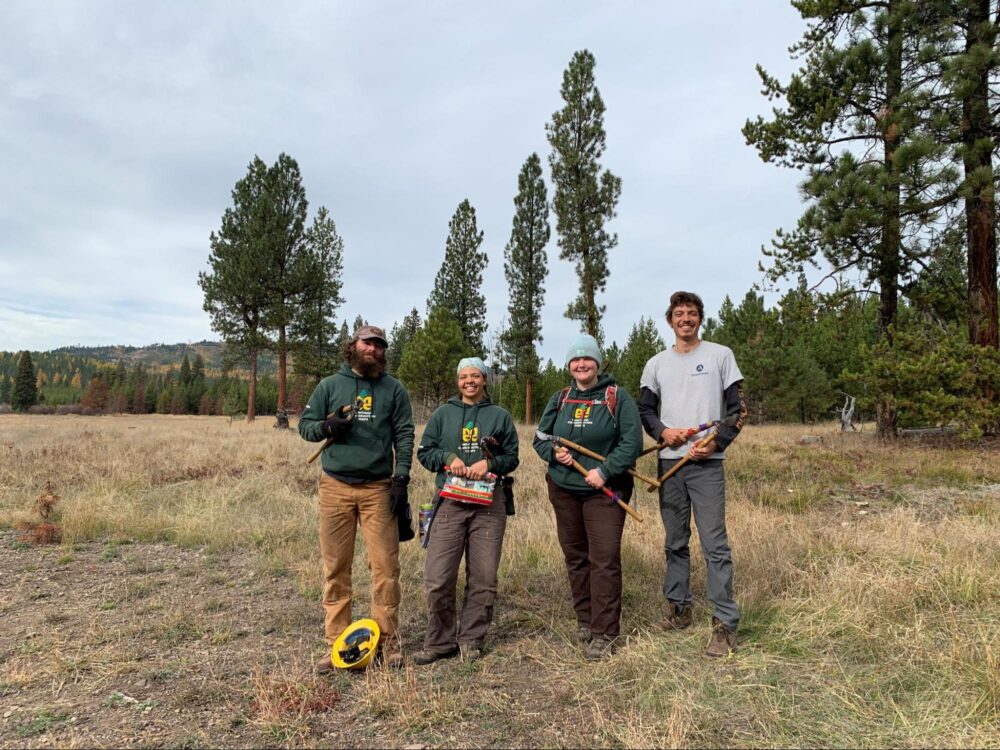We have much more to do and your continued support is needed now more than ever.
Your Recommended Daily Allowance of Real Food
On a sunny day in October 2008, ten students marched across Brown University’s campus with a very small message for the school’s vice president. Rather, they carried hundreds of very small messages. In their hands they held cardboard boxes overflowing with fresh local apples, corn, squash and peaches, each adorned with a miniature flag carrying a special hand-written note. They read: “It just tastes better!,” “Fight climate change-invest in sustainable agriculture,” and “Real food = fair and sustainable food.”
The fruits and vegetables soon covered every surface of the vice president’s office, rendering printers, mailboxes, cabinets and chairs invisible. A line of Rhode Island-grown apples snaked around the secretary’s desk while bright ears of corn lined the windowsills. At the end of the day, the office’s staff left smiling with bags of fresh produce for their families. For our vice president, the significance was not lost: inaction on this issue was no longer an option.
This fall saw thousands of students across the country rallying for real change in their campus food systems, as part of the Real Food Now! National Month of Action. Over 300 campuses are now connected through the Real Food Challenge, a national initiative uniting students for a just and sustainable food system.
“This is a truly unprecedented event,” said Tim Galarneau of the Center for Agroecology and Sustainable Food Systems. “Although farm-to-college programs, farmworker advocacy campaigns and college farms have been gaining ground for over a decade, never before have students from these often-fragmented networks come together with such a powerful result.”
This is just the latest demonstration of what is quickly becoming apparent on campuses all across the country: young people — whether concerned with climate change, global poverty, agriculture, or public health — are recognizing the pressing need for a radical transformation in our global food system. The rate of diabetes in the US has doubled in the past ten years alone and is still on the rise. The food and agriculture sector has been proven to contribute 33% of all human-made greenhouse gasses. Meanwhile, increasing (and increasingly volatile) food prices are so bad that food riots have erupted across the globe. For many students, the situation is growing more dire every day. We will not be able to solve climate crisis, the diabetes epidemic, or difficult issues of migration and labor exploitation if we do not address the systemic failures of current food system.
These are not the type of food issues our executive chefs usually deal with. They’re used to comments like, “More vegetarian options, please!” or “Bring back Chicken Finger Fridays!” (Grumbling about cafeteria food will never get old.)
Yet, these very same college and university food service operations-representing over $4 billion worth of purchases annually — have an incredible opportunity to make a meaningful impact on the health of individuals, our communities, and the earth.
At Brown we are partnering with our food service operators and key administrators in a collective effort to bring healthier food to campus and lower our greenhouse gas emissions, and have reason to believe we can accomplish more.
Brown University President Ruth Simmons, like many others, has already demonstrated leadership by responding to students call for climate neutrality with a community-based carbon offsetting program. More recently, she’s throwing her support behind a student-initiated campaign to completely divest from companies implicated in the genocide in Darfur. Now, we stand poised to take another huge step forward for environmental sustainability and social justice — for real food.
This will mean changing business as usual. It will mean investing in local, community-based farmers, in fair trade and fair labor practices, and holding to ecologically sound productions systems. It will mean recognizing that “higher education” happens three times a day, seven days a week. And most importantly, it will mean university leaders coming to the table with students, farmers, farmworkers, and other food system stakeholders in good faith-building new, working relationships based on equity and a deep respect for the earth.
David Schwartz is a Senior at Brown and has spent spent the last 8 years organizing for real food in Boston, MA and Providence, RI. He recently learned to knit, and has just finished a beautiful green scarf.




















